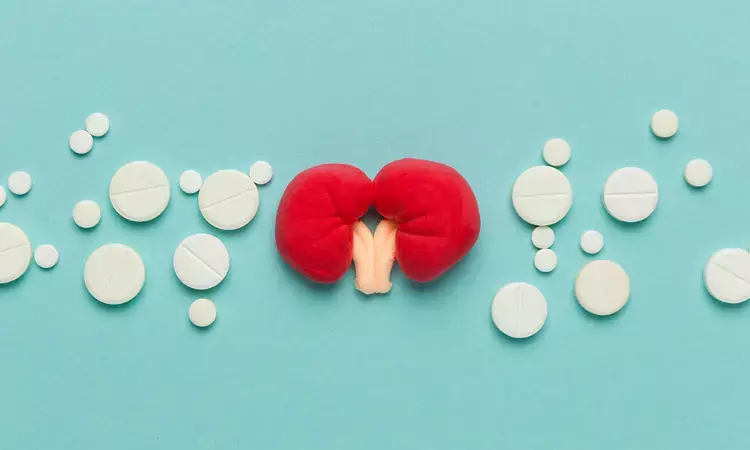- Home
- Medical news & Guidelines
- Anesthesiology
- Cardiology and CTVS
- Critical Care
- Dentistry
- Dermatology
- Diabetes and Endocrinology
- ENT
- Gastroenterology
- Medicine
- Nephrology
- Neurology
- Obstretics-Gynaecology
- Oncology
- Ophthalmology
- Orthopaedics
- Pediatrics-Neonatology
- Psychiatry
- Pulmonology
- Radiology
- Surgery
- Urology
- Laboratory Medicine
- Diet
- Nursing
- Paramedical
- Physiotherapy
- Health news
- Fact Check
- Bone Health Fact Check
- Brain Health Fact Check
- Cancer Related Fact Check
- Child Care Fact Check
- Dental and oral health fact check
- Diabetes and metabolic health fact check
- Diet and Nutrition Fact Check
- Eye and ENT Care Fact Check
- Fitness fact check
- Gut health fact check
- Heart health fact check
- Kidney health fact check
- Medical education fact check
- Men's health fact check
- Respiratory fact check
- Skin and hair care fact check
- Vaccine and Immunization fact check
- Women's health fact check
- AYUSH
- State News
- Andaman and Nicobar Islands
- Andhra Pradesh
- Arunachal Pradesh
- Assam
- Bihar
- Chandigarh
- Chattisgarh
- Dadra and Nagar Haveli
- Daman and Diu
- Delhi
- Goa
- Gujarat
- Haryana
- Himachal Pradesh
- Jammu & Kashmir
- Jharkhand
- Karnataka
- Kerala
- Ladakh
- Lakshadweep
- Madhya Pradesh
- Maharashtra
- Manipur
- Meghalaya
- Mizoram
- Nagaland
- Odisha
- Puducherry
- Punjab
- Rajasthan
- Sikkim
- Tamil Nadu
- Telangana
- Tripura
- Uttar Pradesh
- Uttrakhand
- West Bengal
- Medical Education
- Industry
Intensive blood sugar controls progression of kidney damage in diabetics: JAMA

Timely blood glucose management is critical for avoiding diabetic kidney disease, and intensive vs routine glycemic control may not be linked with higher protection against the development of existing diabetic kidney disease. End-stage kidney disease (ESKD) is becoming more common across the world, and diabetes is the primary cause of ESKD.
Lowering blood glucose levels in diabetic individuals is linked to a lower incidence of diabetic kidney damage.
The optimal glycemic control goal in diabetic renal disease is unknown. Hae Hyuk Jung conducted this study with the goal of exploring optimum on-treatment glycemic levels related with delaying the course of diabetic kidney damage.
The outcomes of this study were published in The Journal of the American Medical Association.
From 2005 to 2019, this retrospective cohort analysis used countrywide Korean cohorts from the National Health Information Database. Adults with diabetes using anti hyperglycemic medications with and without chronic kidney disease (CKD) were included in the study, who were identified via a countrywide health screening survey performed from 2009 to 2010. The data was studied from October 2020 to March 2021. The main outcome was a combination of serum creatinine doubling, end-stage renal disease, or death from CKD.
A fasting blood glucose level of 126 mg/dL to less than 160 mg/dL among individuals with albuminuria was associated with a lower risk of the composite outcome of serum creatinine doubling, end-stage kidney disease, or death from chronic kidney disease in this cohort study of 183 049 adults with diabetes using anti hyperglycemic agents. A fasting blood glucose level of 100 mg/dL to less than 126 mg/dL was linked with a lower risk of the composite outcome, and a level of less than 140 mg/dL was associated with a lower risk of new-onset albuminuria in people with no albuminuria.
In conclusion, Diabetes and CKD patients require a personalized and thorough approach to treatment. Nonetheless, strict glycemic management may be associated with lower overall health risks in CKD patients, particularly those with minimal albuminuria.
Reference:
Jung, H. H. (2021). Evaluation of Serum Glucose and Kidney Disease Progression Among Patients With Diabetes. JAMA Network Open, 4(9), e2127387. https://doi.org/10.1001/jamanetworkopen.2021.27387
Dr Kartikeya Kohli is an Internal Medicine Consultant at Sitaram Bhartia Hospital in Delhi with super speciality training in Nephrology. He has worked with various eminent hospitals like Indraprastha Apollo Hospital, Sir Gangaram Hospital. He holds an MBBS from Kasturba Medical College Manipal, DNB Internal Medicine, Post Graduate Diploma in Clinical Research and Business Development, Fellow DNB Nephrology, MRCP and ECFMG Certification. He has been closely associated with India Medical Association South Delhi Branch and Delhi Medical Association and has been organising continuing medical education programs on their behalf from time to time. Further he has been contributing medical articles for their newsletters as well. He is also associated with electronic media and TV for conduction and presentation of health programs. He has been associated with Medical Dialogues for last 3 years and contributing articles on regular basis.
Dr Kamal Kant Kohli-MBBS, DTCD- a chest specialist with more than 30 years of practice and a flair for writing clinical articles, Dr Kamal Kant Kohli joined Medical Dialogues as a Chief Editor of Medical News. Besides writing articles, as an editor, he proofreads and verifies all the medical content published on Medical Dialogues including those coming from journals, studies,medical conferences,guidelines etc. Email: drkohli@medicaldialogues.in. Contact no. 011-43720751


